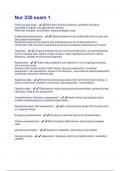Exam (elaborations)
Nur 230 exam 1 Questions With 100% Correct Answers.
- Course
- Institution
Follow up data base - ️️Short term/ chronic problems, problems should be evaluated at regular and appropriate intervals What has changed, worse/better, coping strategies used Evidenced based practice - ️️Patients deserve to be treated with most current and best practice techniques Syst...
[Show more]



